VLC is among the most trusted media player software because of its broad codec support. Although VLC can play MKV , these files can sometimes challenge VLC’s performance due to its complex container structure and modern codec support. This post will address common playback problems when playing MKV files in VLC. And to help you, we will provide solutions to resolve these issues. We aim to help you optimize VLC settings and explore alternative options to ensure reliable MKV playback.

- Part 1. Understand MKV & VLC Compatibility
- Part 2. Common MKV Playback Problems & Solutions
- Part 3. Optimize VLC for MKV Playback
- Part 4. Alternative Media Players for MKV Files
- Part 5. MKV Conversion
- Part 6. FAQs about MKV Playback on VLC
Part 1. Understand MKV & VLC Compatibility
MKV , short for Matroska Video, is a multimedia container format for multiple media content. It can store video, audio, subtitles, and other data within a single file. Since it is a container format, it doesn’t dictate how the media content is encoded. This aspect makes MKV adaptable, but it also causes compatibility issues.
Now, the question is, can VLC play MKV format? Well, it depends. Although VLC Media Player has built-in support for most encoders, playback performance can suffer with newer codecs. MKV files often include HEVC/H.265 or AV1 codecs, which aren’t supported by all versions. Older VLC versions struggle to decode newer codecs efficiently, leading to playback issues.
Part 2. Common MKV Playback Problems & Solutions
Black Screen, Audio Only
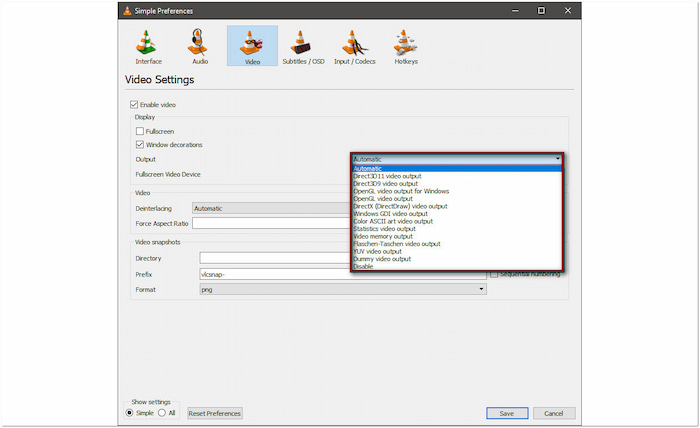
There are instances where VLC plays audio perfectly while the screen remains black. This happens due to unsupported video output modules or incompatible hardware rendering options. You can fix this by going to the Tools tab, clicking Preferences, and selecting Video. Under Output, change the video output from Automatic to DirectX or OpenGL.
No Audio
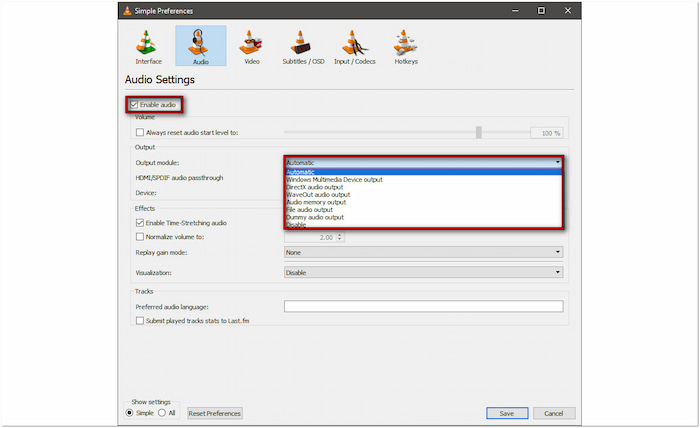
If MKV plays without sound or audio delay in VLC, it means VLC cannot decode the audio within the video. MKV files can contain audio encoded with various codecs, but older VLC versions struggle with newer codecs. In the Tools tab, click Preferences and select Audio. Ensure the Enable Audio is selected, or try switching the output module to another option.
Stuttering or Choppy Playback
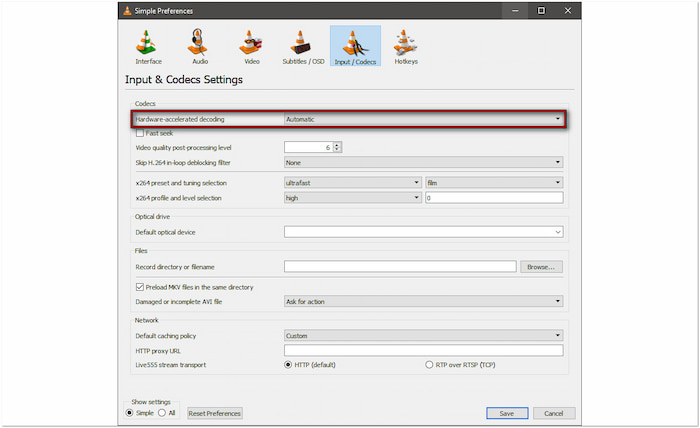
High-resolution MKV files, like 1080p or 4K resolution, may play stuttering or choppy in VLC. It can happen because the video codec is too demanding for your system’s hardware. Navigate to the Tools tab, select Preferences, and click Input/Codecs. Turn on Hardware-accelerated decoding to offload processing to your GPU.
Codec Errors
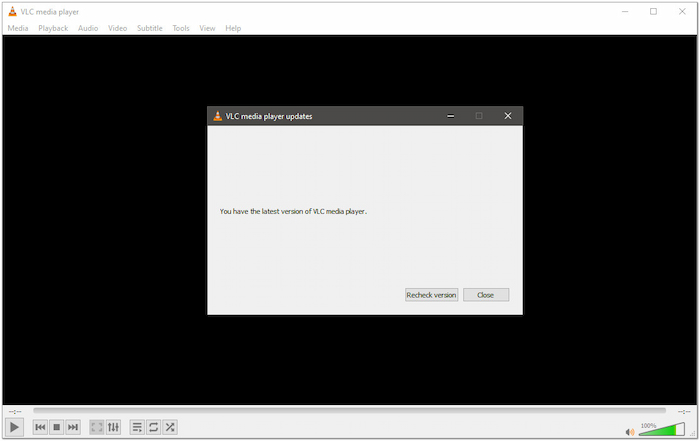
If a codec-related error shows, it means your VLC’s version doesn’t support the codec used in MKV. The most effective solution to fix this is by updating VLC to the latest version. Just so you know, VLC constantly adds new codec support with each release. If updating doesn’t solve the issue, consider converting the MKV file instead.
Corrupted MKV Files
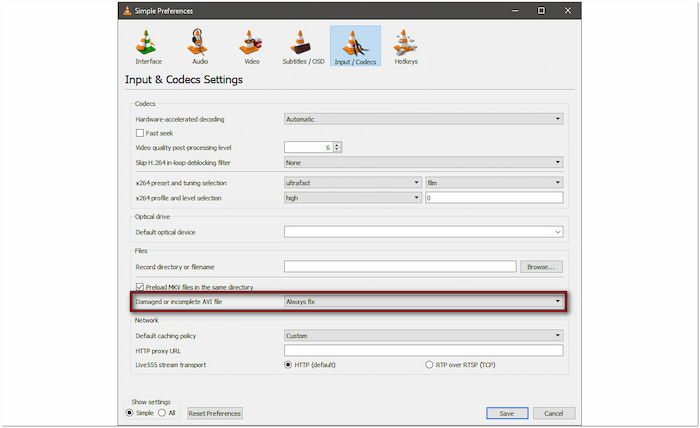
Why can’t I play MKV on VLC? A corrupted MKV file may play partially or not open at all. It occurs due to incomplete downloads, disk errors, or faulty encoding. Select Preferences from the Tools tab and click Input/Codec. Set the Damaged or incomplete AVI file option to Always Fix. Although this setting is meant for AVI files, it sometimes applies to MKV files.
Part 3. Optimize VLC for MKV Playback
Caching
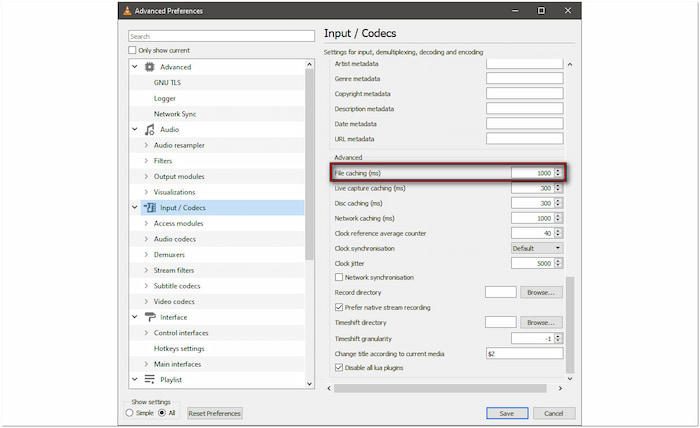
Caching refers to the buffer time the VLC uses to preload video portions before playing it. MKV files with insufficient caching cause lags or stutters during playback. Increasing the caching value allows the VLC Media Player to buffer more data, reducing playback interruptions.
Hardware Acceleration
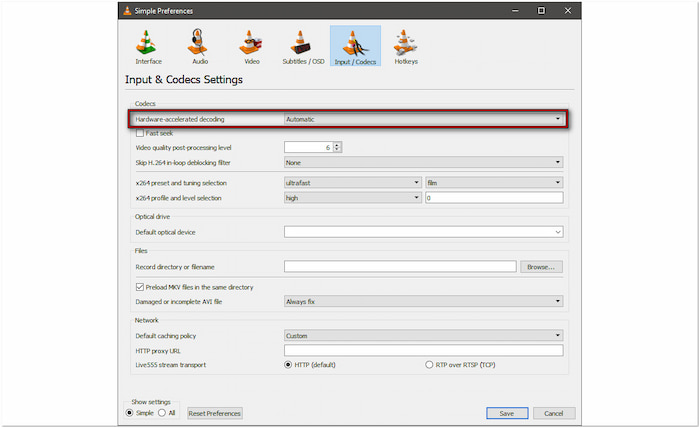
Hardware-accelerated decoding allows VLC to offload video processing to GPU instead of CPU. It improves performance for high-resolution MKVs, particularly on modern systems. However, it can cause glitches or crashes on older or incompatible systems.
Output Modules
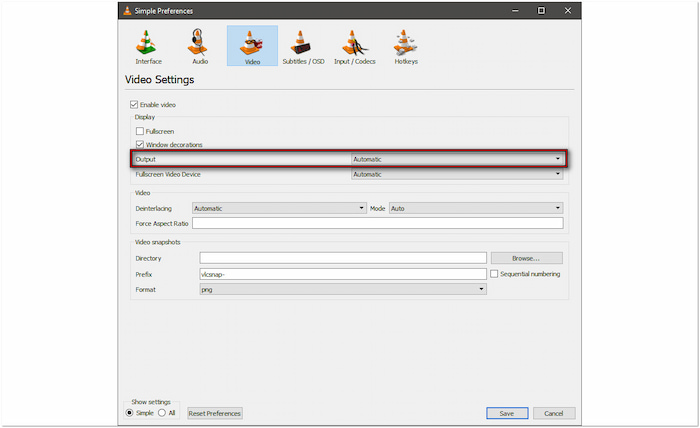
VLC uses different output modules to render video on your screen. The default module may not be ideal for all systems, especially if you’re experiencing issues like black screens. Switching to a more compatible module resolves display issues and can improve MKV playback quality.
Codec Settings
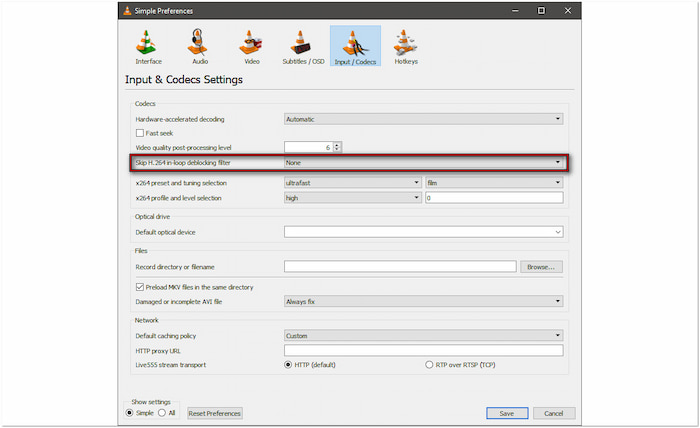
Will VLC play MKV with a newer codec? MKV files can use demanding codecs like HEVC/H.265 or even AV1. These codecs may not perform well on all systems, mainly on older ones. VLC allows codec configuration to improve playback, like skip loop filters or post-processing.
If you have older hardware, enable the Skip H.264 in-loop deblocking filter to improve performance. These changes reduce the workload, allowing VLC to handle MKV files more efficiently.
Part 4. Alternative Media Players for MKV Files

Although VLC Media Player can play MKV files, it’s not always the most stable option. As mentioned, VLC struggles with dealing with high-definition videos and newer MKV codecs. If you need a reliable alternative, Blu-ray Master Free Blu-ray Player is what you need. Here’s why:
Free Download
For Windows
Secure Download
Free Download
for macOS
Secure Download
• It is fully compatible with Mac OS X 10.9 or above and Windows 11/10/8/7.
• It supports newer video and audio codecs, including .H.265/HEVC, AV1, DTS, etc.
• It delivers high-definition video content with surround sound audio.
• It runs smoothly on various hardware configurations, including less powerful systems.
• It allows customization of the player’s interface, playback settings, and other options.
• It features advanced playback controls like screen size, audio tracks, snapshots, etc.
• It allows importing external subtitle files, including SRT, ASS, SUB, and more.
• It allows access to all features and functionalities completely free of charge.
Part 5. MKV Conversion
If MKV playback continues to cause issues, the best thing you can do is convert it. Converting MKV into a more compatible format ensures error-free playback across devices and media players. A highly recommended tool for this purpose is the preferred Video Converter Ultimate of Blu-ray Master. It can convert MKV to thousands of profiles, including MP4, AVI, FLV, MOV, WMV, etc. It uses advanced hardware acceleration technology to process video up to 70× faster. In addition, it retains all the sources, keeping your video sharp and clear.
Step 1.First things first, download the Video Converter Ultimate, recommended by Blu-ray Master, for free. Install the MKV conversion software and complete the installation process. Once the installation is finished, run the software on your system.
Free Download
For Windows
Secure Download
Free Download
for macOS
Secure Download
Step 2.As soon as it starts, it will lead you to the Converter tab by default. Click + Add Files to import individual MKV files into the software. Alternatively, select Add Folder from the pulldown menu to load all the files from a single folder in batch.
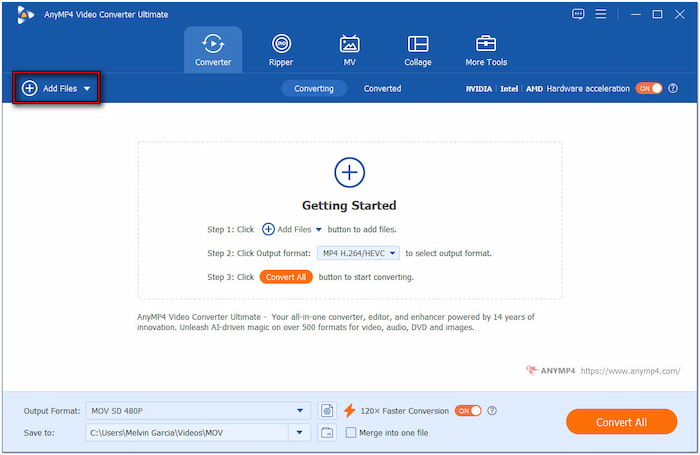
Step 3.Click the Output Format field and navigate to the Video category. On the left navigation, select a profile, and on the right navigation, choose a quality preset. For this demonstration, we will select the MP4 profile and 4K Video quality preset.
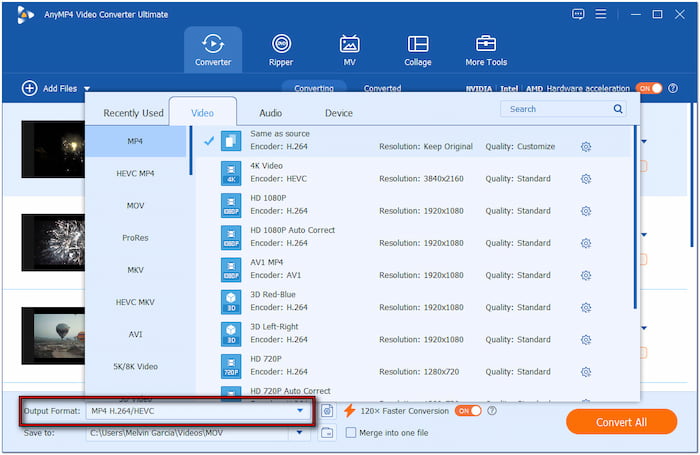
Step 4.Proceed to the Save To field and select Browse & Select Folder to specify the output directory. In the upper-right navigation, turn on Hardware Acceleration for 120× faster lossless conversion. After all the settings are set, click Rip All to export MKV to a new profile.
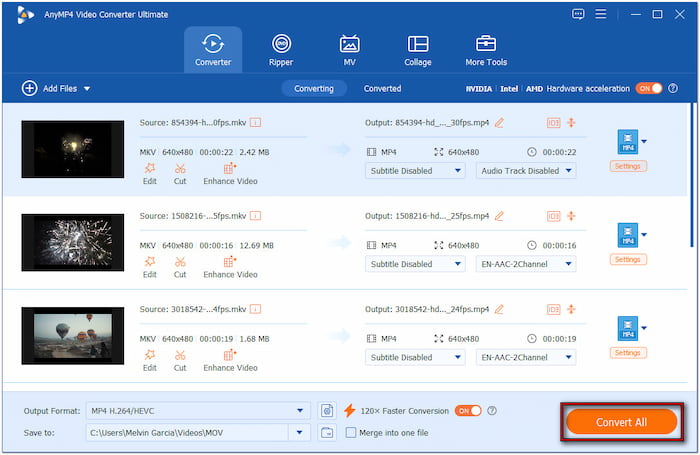
Video Converter Ultimate is your companion for converting MKV files into a more compatible format. Beyond its conversion features, it includes additional tools for editing and enhancing your videos before conversion, such as Video Trimmer, Cropper, Enhancer, etc.
Part 6. FAQs about MKV Playback on VLC
-
What is the disadvantage of MKV?
MKV files are larger due to high-definition videos, multiple tracks, and subtitles. They also have inconsistent playback support, which can lead to compatibility issues.
-
Are MKV files safe to open?
Yes, MKV files are safe to open, provided they are from a trusted source. However, malicious actors can embed harmful scripts or codecs in files pretending to be video content.
-
Which software supports MKV files?
Many media player software supports MKV files, but Blu-ray Master Free Blu-ray Player is the best option. This software handles various video and audio codecs embedded in MKV.
Wrapping up
In conclusion, VLC can play MKV thanks to its broad codec support. However, some users still experience issues during playback. But worry not; you can resolve these issues by trying the troubleshooting guides we discussed earlier. If you still face playback problems afterward, consider an alternative media player, the Blu-ray Master Free Blu-ray Player. This software can handle newer codecs efficiently, ensuring error-free MKV playback.
More from Blu-ray Master
VLC Solutions
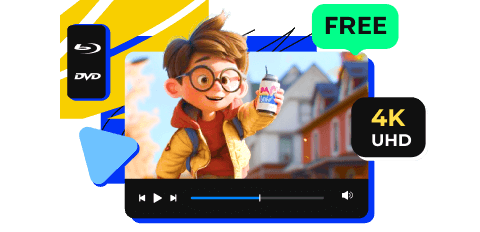
Easily play Blu-rays, DVDs, and various video/audio formats with rich playback features.
100% Secure. No virus

